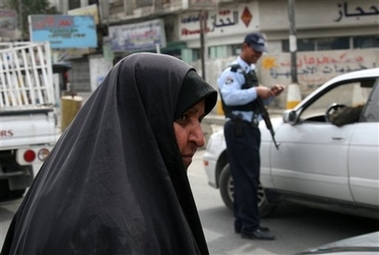Iraq's al-Maliki tours Baghdad streets
(AP)Updated: 2007-03-09 20:08
BAGHDAD - Iraq's prime minister strolled Baghdad's streets and visited police checkpoints Friday to showcase security ahead of an international conference aimed at stabilizing the war-torn country with help from its neighbors.
 A woman passes by a vehicle checkpoint as an Iraqi policeman checks the identity of a driver in Baghdad, Iraq, Thursday, March 8, 2007. [AP]  |
Al-Makiki's office did not release any advance details of the outing or even say where he visited because of safety concerns.
Security was heightened across Baghdad as international envoys prepared to arrive for Saturday's conference, which would be held at Iraq's Foreign Ministry just outside the heavily fortified Green Zone.
"Additional security measures have been taken to protect the officials participating in the conference and to secure the location of the meeting," said Brig. Abdul-Karim Khalaf, an Interior Ministry spokesman.
U.S. forces, meanwhile, killed a suspected militant and captured 16 others in raids across Iraq, the military said. Among those detained were a man accused of working in al-Qaida's media wing and another believed to be responsible for kidnappings, beheadings and suicide attacks.
South of the capital, Shiite Muslims began holy rites in Karbala at the start of a holiday that marks the end of a 40-day mourning period after the anniversary of the death of the Prophet Muhammad's grandson.
Crowds of pilgrims held their hands in the air and bowed their foreheads to the ground, chanting prayers outside Karbala's Imam Hussein shrine, 50 miles south of Baghdad. Iraqi television channels streamed live video of noontime prayers at the shrine.
Millions of pilgrims have traveled to Karbala over the past week, and more than 340 people died in violence since Monday - most of them Shiite pilgrims killed in sectarian attacks along the way.
Security was tightened around Karbala on Friday after authorities received an anonymous tip about possible suicide bombers sneaking into the city, said Abdul al-Aal al-Yassiri, head of Karbala's provincial council.
Four million pilgrims were attending rites Friday, he said.
In Cairo, Egypt's Foreign Ministry said the foreign minister for Arab affairs, Hani Khalaf, would lead his country's delegation to Baghdad on Saturday.
"Egypt will provide all possible aid to help the Iraqi people build its national institutions and rebuild the country," a Foreign Ministry statement said.
But bitter squabbles have broken out between Arab countries and Iraq's government ahead of the conference that the U.S. had hoped would unite them.
Sunni-led Arab governments will likely use the conference to press for a greater Sunni role in Iraq. That has rankled Iraq's Shiite leaders, who believe the Arabs are trying to reverse their newfound power after decades of being marginalized under Sunni minority rule.
The dispute reflects the complicated tensions that are likely to surface at the meeting, which gathers diplomats from Iraq's Arab neighbors, Iran, the United States, Turkey and the permanent members of the U.N. Security Council.
Arab states are likely to try to win U.S. support for their demands, increasing the pressure on Baghdad. Iran has vowed to support its Shiite allies in the Iraqi government - but is also concerned the U.S. will press it on accusations that Tehran is supporting Shiite militants fueling Iraq's bloodshed.
It was unclear whether the U.S. and Iran would hold direct meetings on the sidelines of the multilateral conference.
David Satterfield, the top State Department adviser on Iraq, said Thursday that the U.S. would not walk away from direct one-on-one talks with Iran or Syria, but the Bush administration apparently does not plan to seek out such contact.
Satterfield spoke to reporters in Washington before leaving for Baghdad, where he would lead the U.S. delegation.
"Iraq needs support not just from us, not just from our coalition partners, but it needs broader support from its neighbors, from the region, from the international community," he said. "We see the neighbors conference...as a significant step in that process."
Saturday's meeting would be "a process, not just a one-off event," Satterfield said.
"It is a process which allows them to articulate directly to their neighbors...what they are doing and what they are pledged to do in the future on security, on political progress, on economics," he said.
The conference came a day after the new commander of U.S. forces in Iraq, Gen. David Petraeus, told reporters in Baghdad that military force alone was "not sufficient" to end the conflict.
Petraeus said that "any student of history recognizes there is no military solution to a problem like that in Iraq, to the insurgency in Iraq."
Instead, he said political talks must eventually include some militant groups now opposing the U.S.-backed government.
"Military action is necessary to help improve security ... but it is not sufficient," Petraeus said. "A political resolution of various differences...of various senses that people do not have a stake in the successes of Iraq and so forth - that is crucial. That is what will determine, in the long run, the success of this effort."
|
||
|
||
|
|